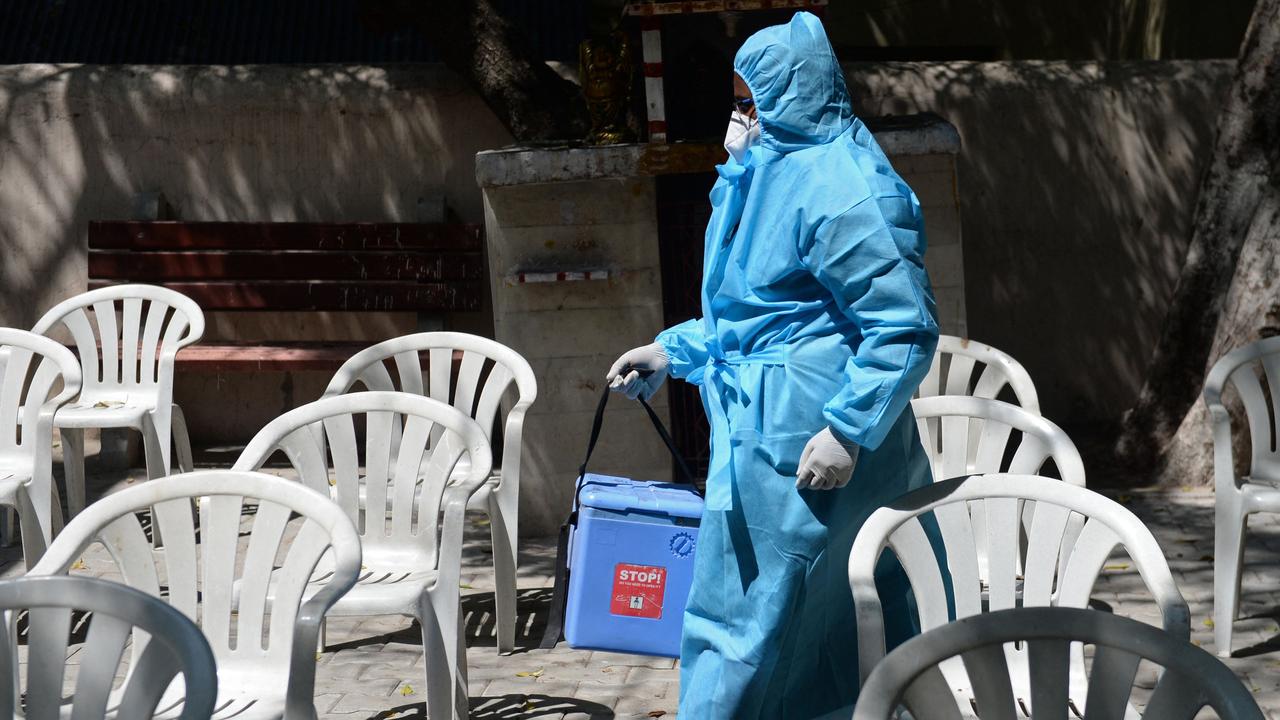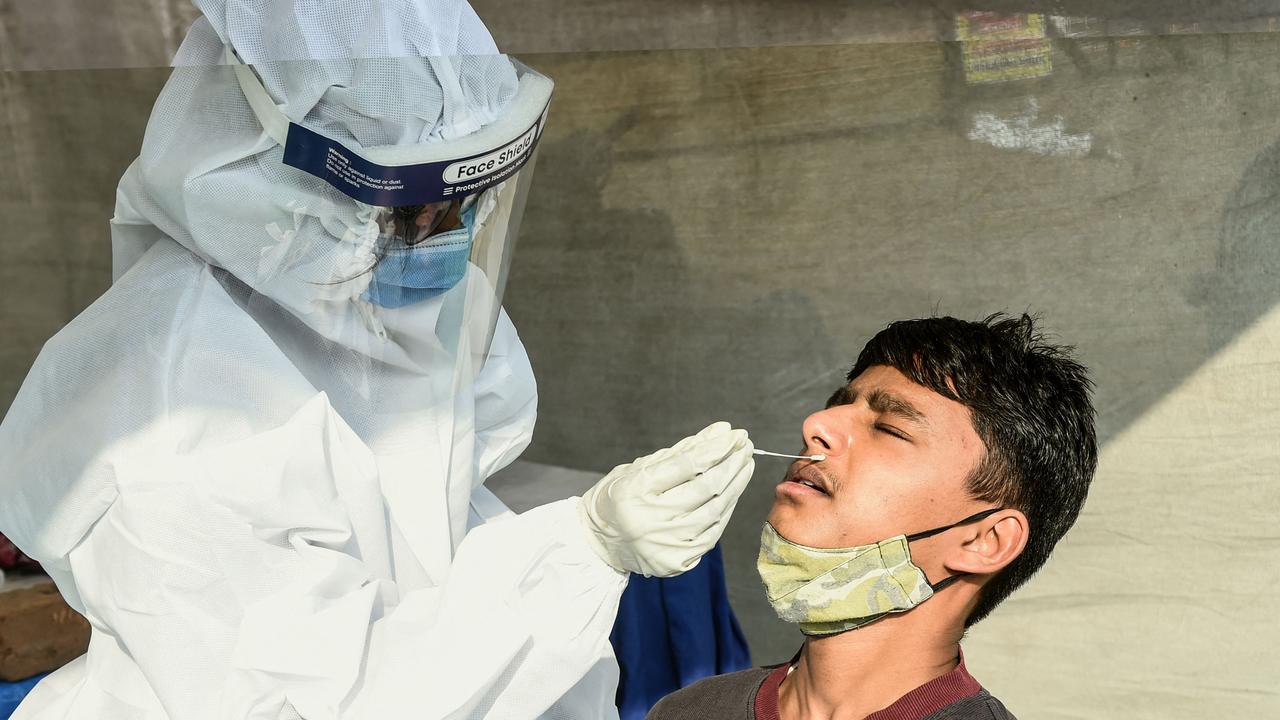India coronavirus: 240 new COVID strains found as cases suddenly surge
COVID appeared to be vanishing in one of the world’s biggest nations, but cases are suddenly surging again and experts have a bleak theory as to why.

Life had pretty much returned to normal in India’s bustling cities since the beginning of the year with streets filled with people, marketplaces booming and the smell of street food filling the air.
The coronavirus pandemic had taken world’s most populous nation on a rollercoaster ride that saw it on the brink of utter chaos in September to a sudden drop in cases and deaths that has left health experts all over the world scratching their heads.
Nearly 100,000 new infections were reported each day when the virus took hold of the nation of 1.3 billion people in September – and India was on course to overtake the USA and record the biggest of case toll of any nation.
There were grave fears over the impact of the surge, as hospitals in some of India’s major cities reached capacity.
However, things began to change unexpectedly and suddenly, as cases started to plummet overnight and the number of daily deaths linked to the disease soon followed.
Just last week, new daily cases were hitting around 11,000 each day – a 90 per cent drop from the peak in September – prompting life to return to normal in many parts of the nation.
However, that number has increased substantially in the past few days, to over 14,000, and health experts have made some concerning discoveries among the new infections.
RELATED: US death toll reaches 500,000

RELATED: Truth of country’s COVID-free claim
Authorities are particularly concerned about what is happening in Maharashtra, a state in the western peninsular region, where cases have suddenly surged.
Dr Shashank Joshi, a member of Maharashtra’s COVID Task Force, told Indian media that experts have detected 240 new strains of the virus across India in the recent surge.
He believes some of the new strains may be more infectious and could be a reason for the sudden increase in cases.
Dr Randeep Guleria, director of the All India Institute of Medical Sciences, told NDTV the new Indian strains could be highly transmissible and even cause reinfections in people who have developed antibodies to the virus.
Four more states – Kerala, Madhya Pradesh, Chhattisgarh and Punjab – have also been witnessing a spike in numbers, resulting in the steepest increase in cases since the end of November.
In Maharashtra, the worst-affected state, 6971 new cases were reported in 24 hours yesterday – the most since October 24, when 7347 were detected. The state accounted for more than 41 per cent of the total cases reported in India in the third week of this month.
The state’s Chief Minister Uddhav Thackeray said the situation in his state was “serious” and warned of a lockdown if the numbers continued to increase.
In a message to residents of the state, he said there would be dire consequences for those who broke the rules – and pointed to Western nations as an example of how the virus can surge if people let their guard down.
He implored residents to wear face masks and maintain social distancing while in public, saying a drop in compliance is contributing to the spike.
“I’m asking this question again? Do you want a lockdown? I will observe for the next fortnight and I’ll get the answer. Those who do not want a lockdown are sure to adhere to all regulations, those who seek it, will violate them just as surely,” Mr Thackeray said.
“If we do not wear a mask, then the hidden enemy will attack us. Hence, even after vaccination, one must mandatorily wear masks.
RELATED: UK exit from lockdown revealed

RELATED: Front page shows dire US situation
“Regrettably, the public had let down their guard in the past few days once the number of cases dropped and several people stopped wearing masks under the illusion that the COVID-19 pandemic has altogether disappeared.
“Even in Western countries, a relaxation and dropping of guard has resulted in a dangerous spike and a subsequent lockdown.”
India had been doing comparably well to the rest of the world in handling the crisis considering its size and population density – despite questions being raised about its testing capabilities.
There are also questions about how the country is counting virus deaths, so both cases and deaths are likely to be higher than the official figures suggest.
The virus has devastated parts of the nation of 1.3 billion people with nearly 11 million cases reported and over 155,000 deaths. But for comparison, the US has recorded over 28 million cases and over half a million deaths from the virus – from a population of 328.2 million. In total, around 2.4 million people have died worldwide.
Before the latest resurgence of cases, experts were left perplexed by India’s sudden drop in daily cases since the September peak – seen in almost every region of the nation – with some suggesting it may have reached herd immunity or that Indians may even have some pre-existing protection from the virus.
Vaccines have so far been ruled out as a reason alone as the country’s vaccination program didn’t begin until January, and cases were dropping well before then.
The Indian government took some of the credit, saying its tough rules on mask wearing and heavy fines for those that break them in some cities are at least partly responsible.
However, experts shot this down, saying that the level of mask wearing fluctuates wildly from area to area in India, meaning it would not account for cases dropping nationally in such a uniform way.
Vineeta Bal, who studies immune systems at India’s National Institute of Immunology, told Sky News that some large areas may have reached herd immunity.
Herd immunity happens when a large portion of a community becomes immune to a disease through vaccination or through the mass spread of the disease.
RELATED: Threat to Aussie vaccine supply

A nationwide antibody screening by national health agencies found that one in five Indians had caught the virus before vaccinations had begun – and that rate rose to 50 per cent of the population in some major cities
However, Dr Guleria director said immunity for coronavirus is a “myth” in India because at least 80 per cent people need to have antibodies for the whole of the population to be protected – and the new variants picked up this week throw another spanner in the works.
He told NDTV the mutations have an “immune escape mechanism”, meaning they can threaten the immunity achieved by a person through vaccinations or the disease and cause reinfection.
Another theory for the drop in cases since September’s peak is that many Indians are exposed to such a wide variety of diseases and germs throughout their lives — like cholera, typhoid and tuberculosis — that their bodies are more resilient in their immune response to new illnesses like coronavirus.
“If the COVID virus can be controlled in the nose and throat, before it reaches the lungs, it doesn’t become as serious. Innate immunity works at this level, by trying to reduce the viral infection and stop it from getting to the lungs,” Dr Shahid Jameel, who studies viruses at India’s Ashoka University, told the Associated Press.




